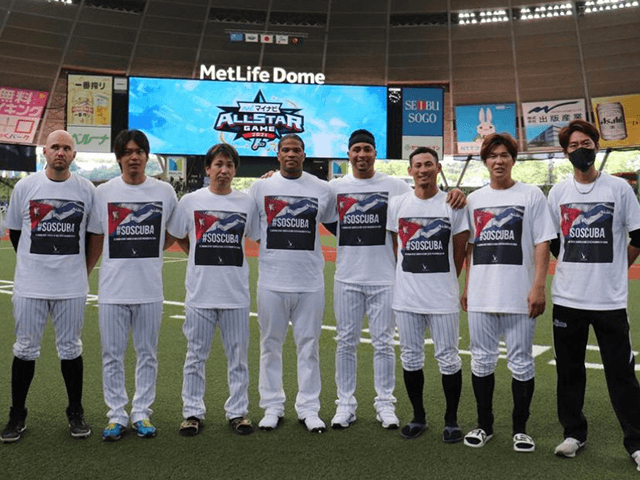The Chiba Lotte Marines, a team in Japan’s Nippon Professional Baseball (NPB) league, wore matching T-shirts and took a photo together showing solidarity for anti-communism protesters in Cuba, a team member revealed in a photo posted on Twitter Sunday.
One of the team’s members, Leonys Martin, posted the photo on Twitter. Martin, who is of Cuban descent, thanked his teammates “for this great support for the freedom of my country, from afar, but we support you, my Cuba.” Martin also thanked another Cuban baseball player in the Japanese league, Dayan Viciedo of the Chunichi Dragons, for helping organize the effort.
The team members wore shirts reading #SOSCuba, a social media hashtag protesters and sympathizers are using to share videos of the peaceful protests and communist repression globally, as well as a graph of the Cuban flag. The team reportedly wore the shirts during a game on Saturday.
Gracias a mi hermano Viciedo y mis compañeros de equipos por este apoyo por la Libertad de mi país desde lejos pero te apoyamos mi Cuba Patria y Vida 🇺🇺🇺🇺🇺 pic.twitter.com/UDKJXNRjja
— Leonys Martin (@leonys27martin) July 18, 2021
Cuba is one of the world’s most formidable baseball powerhouses, a fact that has become increasingly political as baseball players use their talents to escape into exile, particularly in the United States. In Japan, a nation where baseball enjoys significant popularity, Cuban baseball players on teams are not uncommon.
The Japanese team’s support stands in contrast with the silence of many American celebrities who traveled to and enjoyed tourism in Cuba – allegedly banned by the “embargo” – during the tenure of President Barack Obama, who greatly expanded trade with the Castro regime. Bold-faced names such as Beyonce and Jay-Z, Katy Perry, Rihanna, and the Kardashians have said nothing in support of unarmed, peaceful Cuban protesters taking the streets against the communist regime for the past week, notable silence in the context of their high-profile vacations on the island.
The Japanese government maintains diplomatic relations with the Castro regime, despite also maintaining close ties to most of the free world and enduring an antagonistic relationship with its closest communist neighbor, China. Despite typically uneventful ties, Tokyo canceled a planned visit to the island by Foreign Affairs Minister Motegi Toshimitsu on Monday, apparently a response to ongoing protests there. The decision to skip Cuba on a greater tour of the Caribbean and Central America appeared to be abrupt, as Cuban state media, as recently as last Friday, appeared to consider Motegi’s arrival in the next week confirmed.
Cuba sent its own foreign minister, Bruno Rodríguez, to meet with Japanese Ambassador to Havana Hirata Kenji last week to exchange “opinions on the positive state of bilateral relations and the importance of promoting economic, trade and cooperation relations between the two countries” in anticipation of Motegi’s visit, the state-run Prensa Latina reported.
The Japanese government has not issued a public statement explaining the change in Motegi’s itinerary as of press time.
Protests erupted throughout Cuba on July 11, reportedly not organized by any one group but fueled by online reports of protests in other cities. Some estimates suggest as many as 60 different localities nationwide participated in the protests, which mostly consisted of peaceful marches and chants of “freedom” and “patria y vida,” a slogan meaning “fatherland and life” meant as a rebuke of the Cuban Communist Party slogan “fatherland or death” and popularized by a dissident song released this year. The Communist Party responded to the protests by shutting down the internet and launching a wave of “combat,” by both members of state security forces and civilians, against unarmed protesters.
Videos from throughout the week show police shooting live rounds into crowds of protesters and making door-to-door raids seeking suspected protesters to beat, shoot, and disappear into the prison system.
Cubans around the world have joined in nearly daily protests in solidarity with those at home. The largest of these so far occurred in Washington, DC, on Saturday, attracting thousands of peaceful protesters in front of the White House. Many called for American intervention in the repression in Cuba in any way possible – by increasing sanctions on the regime, offering military aid, or helping Cubans regain access to the internet. Protests also occurred throughout Florida, where the largest population of Cuban-Americans in the country reside; New Jersey; California; Kentucky; Illinois, Nebraska, and other parts of the country.
In Cuba, reports surfacing throughout the weekend indicated that, despite the mass arrests and disappearances of dissidents, protests continued, particularly in eastern Cuban cities such as Holguín and Baracoa. The internet shutdown has made it difficult to distribute and verify protest footage since last week, but multiple news outlets with sources on the ground in the country have cited eyewitnesses confirming the ongoing protests.
In Havana, the Castro regime organized an “act of revolutionary affirmation” – a pro-government counter-rally – on Saturday, interrupted by a lone man shouting “freedom!” amid thousands of communists. Video footage taken by Spanish newswire agency EFE shows the man shouting freedom slogans and receiving a gang beating, then being whisked away by State Security agents. His whereabouts remain unknown as of Monday afternoon.

COMMENTS
Please let us know if you're having issues with commenting.